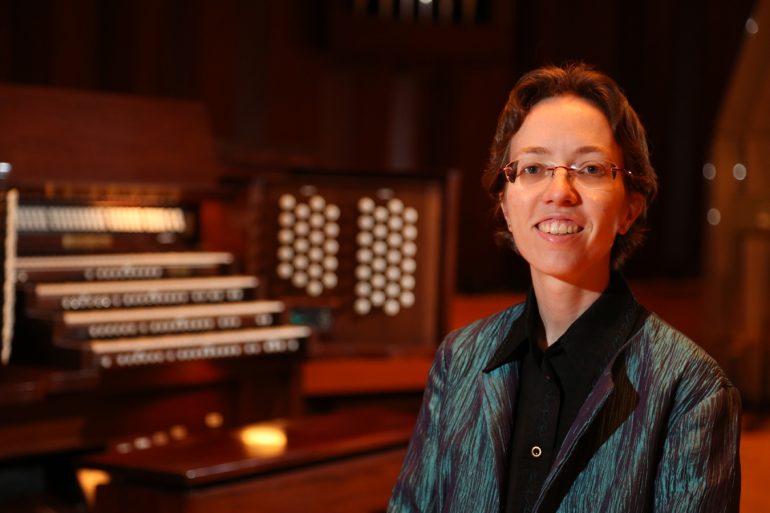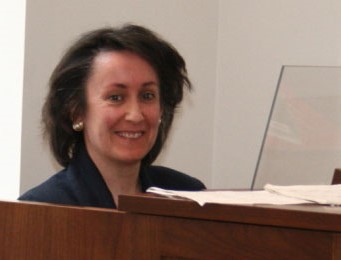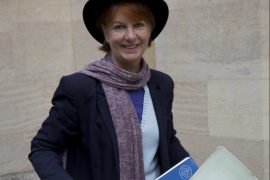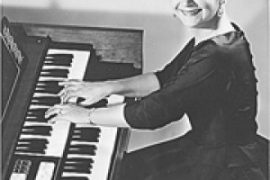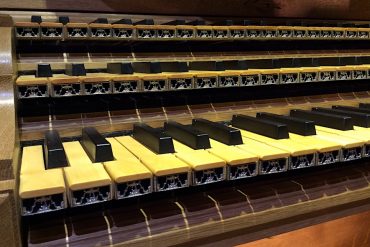Isabelle originally gave me this interview in 2019 to mark a visit to the UK. I’ve republished it here in anticipation of her performances at the AGO National Convention in Seattle, which I’m very much looking forward to.
Isabelle Demers is Associate Professor of Organ at Baylor School of Music in Waco, Texas, and after hearing her play at the Royal Festival Hall a while ago, I’m delighted that she will be back in the UK this September (2019) to give another recital. Born in Quebec, she began her studies at Montreal Conservatory of Music at the age of 11, going on to study in Paris, and at the Juilliard School. The “bracing virtuosity” (Chicago Classical Review) and clarity of her playing make an enormous impression on both organists and non-organists alike.
This month she’ll be playing Bach, Handel, Schumann and Frescobaldi on the restored 1735 Richard Bridge organ at Christ Church Spitalfields in London. Full details below. In the meantime, here are her answers to my five questions:
Which piece of music are you studying at the moment and why?
I’m learning a few different things now for concerts this summer – two scherzos by my friend Jason Roberts, Calvin Hampton’s lullaby from his second suite, Mendelssohn’s sixth sonata, and some of Alkan’s pedal etudes. I think it’s great to work on varied repertoire as it means that my work is never monotonous. After spending 9 months on Petrushka recently, I’m very happy to be back to organ scores – they might be hard to play, but are far easier to read!
What has been your best experience as an organist?
That is very hard to tell because (without wanting to sound cliché), there have been so many fantastic venues, organs, and presenters! But besides concerts, every year I take my students on a study trip to see/play as many instruments as possible. This year we visited London briefly, Toulouse, and Stockholm, and all three cities were fantastic for a variety of reasons. I like those trips quite a bit because I learn a lot myself, and it’s so refreshing to see my students discover some of the best instruments in the world. They are also incredibly witty, so it’s lovely to travel with such good companions, especially given that I usually travel on my own.
What has been your worst experience as an organist?
When I was a student at Juilliard, I was asked to accompany a choir in portions of Messiah. If I recall correctly, there was a brass quintet as well, with most of the musicians being Juilliard faculty. The organ was an old Allen and for some reason, the top plank of the bench was not glued/screwed properly to the legs. During rehearsal, it had a tendency to move with me, so I mentioned it to the organist. His answer was that it had never been an issue for him, so that I shouldn’t worry. (He was about twice my height and weight – perhaps he was simply more “grounded” than me when he played). When the time came for the Hallelujah chorus during the performance, I started playing the first measure. After four or five notes, the plank flipped forward and I ended up playing a very large cluster on the manuals, which was definitely not what Handel wrote in the score. In retrospect it must have sounded very funny, but at the time I was rather mortified!
What’s the best piece of advice you were given by an organ teacher? (and who was it?)
Paul Jacobs, who was my teacher for my Masters and Doctorate at Juilliard, once told me to “be kind and work hard.” It sounds a bit simplistic, but I’ve found it to be the best possible advice in this profession. There are many talented youngsters but talent will only get you so far. As to being nice, both as a church musician and as a concert organist, you will be expected to spend much time with people. Nobody wants to spend hours with a jerk!
What would be your own best piece of advice for student organists?
Aside from working very hard, try to be a well-rounded musician. Go to concerts given by your colleagues in other disciplines; listen to as much music as possible, especially if it’s not organ music; play as many instruments as possible; study voice, conducting, sing in a choir; and so forth. Of course it’s important to spend a lot of time practicing, but having a broader (musical) culture is crucial too. Being open-minded goes a long way too – even if you don’t agree with their playing or suggestions, it’s very likely that you will learn something from every organist you meet.
Full biography, discography, reviews and her forthcoming calendar on Isabelle Demer’s website.
Monday 23rd September 2019 at 7.30pm
Christ Church, Spitalfields
Commercial Street, London E1 6LY
London Underground: Aldgate East/Liverpool Street, Rail: Shoreditch High Street
Isabelle Demers plays Bach, Handel, Schumann and Frescobaldi
on the 1735 Richard Bridge organ, restored by William Drake in 2015.
More details on the organ can be found on the Friends of Christ Church Spitalfields website, and a case study of the restoration with pictures has been written by William Drake Ltd.

